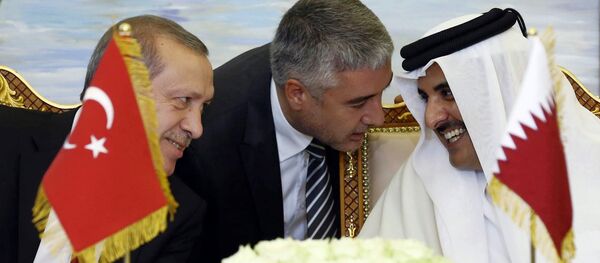On June 5, Saudi Arabia, Bahrain, the United Arab Emirates and Egypt cut diplomatic ties with Qatar and embargoed all sea, air and land traffic to the country, accusing Doha of supporting terrorists and destabilizing the Middle East, and several other states of the region reduced diplomatic relations with the country.
However, Turkey and a number of Middle East countries refused to support this move and started making attempts to help Qatar to break the isolation.
According to Saleha, even before Cavusoglu’s visit Turkey made its stance clear and the visit was yet more proof that Ankara is on the side of Qatar.
"I think that one of the reasons is the need to defend common political and economic interests. In recent years, ties between Ankara and Doha have increasingly developed. Moreover, Qatar has repeatedly provided Turkey with political support, including after an attempted military coup in Turkey. In particular, the development of bilateral ties resulted in the establishment of Turkish military base in Qatar," Saleha pointed out.
Meanwhile, on June 9, Erdogan approved legislation allowing the deployment of Turkish troops to Qatar. According to Turkish Ambassador to Qatar Ahmet Demirok, about 3,000 soldiers of the ground forces, servicemen of the country's air forces and navy, as well as instructors and special forces, will be deployed at the base in Qatar.
"Ankara could preserve those contacts if it works with Saudi Arabia in a frank and fair manner. I guess that the [Turkish] foreign minister should visit Riyadh as soon as possible. Since the crisis erupted Ankara’s efforts to establish dialogue with Gulf states have been insufficient. They should be intensified," the analyst said.
He underscored that in the current situation the Qatar crisis cannot be resolved without the participation of such regional powers as Turkey and Iran. According to Saleha, Turkey was one of the countries that contributed to preventing the crisis from escalating.
Speaking further, the analyst shared thoughts on the possible consequences from the crisis for Ankara.
"In this situation, Turkey believes that it could be the next target [after Qatar]. The Turkish leadership and experts believe that an attack on Turkey will come next. It will be delivered both by Gulf states and the United States. This became clear after [US President] Donald Trump’s visit to Riyadh. This is why Turkey reacted quickly and in such a manner. It may be part of an American plan in the region," Saleha said.
According to the analyst, the way for the implementation of this plan was paved by Trump’s visit to Saudi Arabia.
"Turkey and Iran are opposing this plan. They want to consider the Qatar crisis from a different angle. In turn, Washington ignores their proposals and wants to impose its own view of the situation. The US wants to gain from this crisis because it serves its national interests," he said.
Saleha stressed that the Qatar crisis can only be resolved via dialogue between the Gulf states involved.
"I think that the crisis will deepen as a reaction to the involvement of Turkey and Iran. This is why the Turkish foreign minister should visit Riyadh and Dubai as soon as possible," he concluded.






